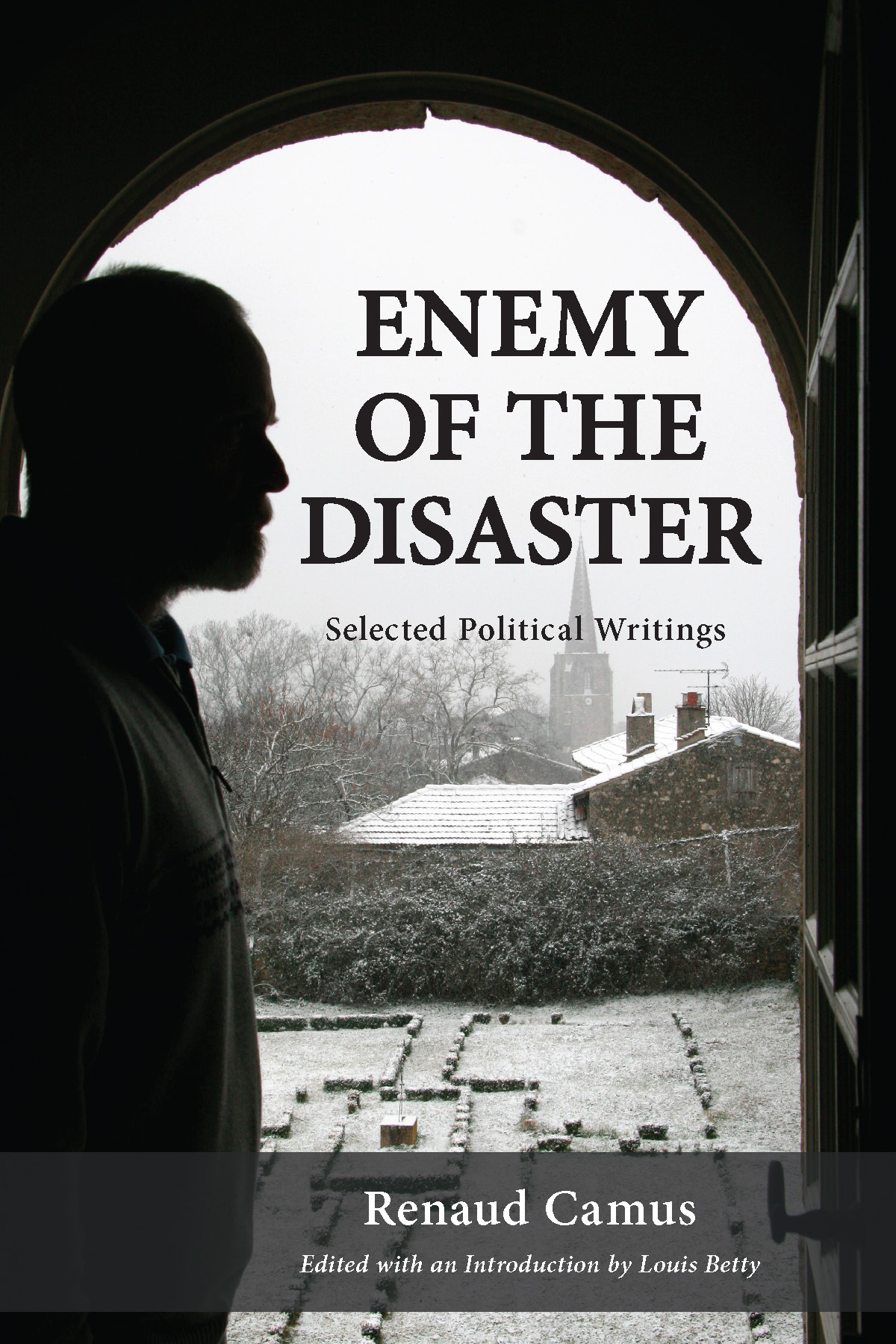
Edited with an Introduction by Louis Betty
“A specter is haunting Europe and the world. It is replacism, the tendency to replace everything with its normalized, standardized, interchangeable double: the original by its copy, the authentic by its imitation, the true by the false, mothers by surrogate mothers, culture by leisure activities and entertainment, knowledge by diplomas, the countryside and city by the universal suburb, the native by the non-native, Europe by Africa, men by women, men and women by robots, peoples by other peoples, humanity by a savage, undifferentiated, standardized, infinitely interchangeable posthumanity.” –Renaud Camus
Paperback
$22.95
Enemy of the Disaster is the first authorized translation to
appear in English of Renaud Camus' political writings and includes his
notorious 2010 speech, "The Great Replacement." Though forty-two years
have passed since his work was last translated into English, Camus is
endlessly and irresponsibly discussed in the media, his vast and complex
oeuvre reduced to a single phrase devoid of all context. In the
English-speaking world, at least, he is the opposite of an author;
he is a floating signifier, a rumor, an element in someone else's narrative.
This volume aims to change that. Spanning the years 2007-2017, its
ten chapters present a very different Camus, one freed from the
opportunistic glosses of “friend” and foe alike. Instead of a
conspiracy theorist, the reader discovers a committed opponent
of conspiratorial thinking of all kinds. Instead of a proponent of
rightwing terrorism, one discovers the founder of a political party
devoted to the promotion of civic peace. Above all, one discovers
in Camus a man of culture, of the high European culture that he sees
everywhere in retreat amid a generalized debasement of humanity.
The book opens with a critical Introduction by its editor, Professor
Louis Betty of the University of Wisconsin-Whitewater. Betty seeks to
free Camus from the various polemical misrepresentations to which he has
been subjected in order to situate him in the context of recent French
debates concerning immigration and identity, debates that have only
become more intense since Camus first entered the fray. Each chapter is
thoroughly annotated to help non-French readers better navigate what
might be unfamiliar references.
Enemy of the Disaster will prove a precious resource to any
serious student of contemporary France. The issues it addresses,
however - issues, not just of immigration and identity, but of culture,
education, and the future of humanity itself - resonate well beyond
the French context. These are issues with which we all, sooner or
later, will need to reckon. By showing us what we have so blithely
abandoned in our mad embrace of an increasingly posthuman future,
Renaud Camus helps us do just that.
"Camus' work deserves to be better understood: his thinking on the ideology he calls 'replacism'
occupies a politically unclassifiable and woefully underpopulated terrain adjacent to several
areas of urgent contemporary importance, including ecology, cultural transmission, and feminism.
Notwithstanding contemporary taboos, anyone thinking seriously about long-term human sustainability
should be reading Camus." - Mary Harrington, author, Feminism against Progress
"These essays are masterpieces of popular philosophy and reflection, and their style, flavour
and essence has certainly survived a very deft translation. Even — especially — if you are determined
to repudiate everything that Camus stands for, to defend everything he laments, you should address
the original text and not the second, third order commentary."
- Simon Evans, The Critic
"For good or ill, an essential publication, as few can genuinely be said to be."
- David Sexton, The Spectator
“A Cassandra for the decadent West, Camus sees and says what so many work so
hard to hide. Not only is he a truth-teller, but he's also a brilliant stylist.
His prose cascades forward with a silk-lined urgency that would make Tom Wolfe jealous.
Without doubt one of the most brilliant polemicists of our era.” - R.R. Reno
“At last, English-speaking readers can find out for themselves why Renaud Camus is so hated
among French elites. We discover in these pages an honest man who refuses to be silent
in the face of civilizational suicide.” - Rod Dreher
“This is an elegant translation of a graceful French stylist, who makes provocative
points with great care. The judicious introduction to this volume helps give a context
to Camus' thoughts about the state of cultural and political affairs in France and
Western Europe.” - Paul Gottfried
“The Great Replacement is neither a fantasy nor a conspiracy; it is the historical
drama of our time.” - Éric Zemmour
"The dazed reader is swept along. The metaphors stun. Irony is deployed to brutal effect...
Camus has no counterpart in the Anglophone world." - Alistair Miller, The Salisbury Review
Renaud Camus
A native of Chamalières in the Auvergne region of central France, Renaud Camus (b. 1946) is one of France’s most brilliant stylists and the author of more than 150 books. Tricks, his first and only work to be translated into English until now, appeared in 1979 and was prefaced by Roland Barthes, one of twentieth-century France’s greatest literary critics and Camus’ mentor. In addition to the political essays collected in Enemy of the Disaster, Camus is also known for works of fiction, philosophy, travel writing, art criticism, and the extensive diary he has kept and published for over forty years. He lives in the Chateau de Plieux in the village of Plieux in southwestern France and is the president of a small political party, the Party of In-nocence, which advocates immigration and education reform and the promotion of civic peace.
Louis Betty
Louis Betty is Associate Professor of French at the University of Wisconsin-Whitewater. In addition to his work on Renaud Camus, he is also the author of Without God: Michel Houellebecq and Materialist Horror (Penn State Press, 2016) as well as numerous scholarly articles. He received his PhD from Vanderbilt University in 2011 and lives in Madison, WI.
Ethan Rundell
Ethan Rundell is a translator, journalist, and alumnus of UC, Berkeley, and Paris' School for Advanced Studies in the Social Sciences (EHESS). Rundell has translated over a dozen books as well as scores of academic articles. He lives in North Carolina.

“If people only know one thing today (and it is not so unusual), it is that there are no races. On this point, they are categorical. The more they know nothing, the more they know this.” –Renaud Camus
Paperback
$11.95
The author of over 150 books in various genres, the French writer
Renaud Camus is perhaps best known as the man who coined the "Great Replacement,"
his phrase to describe the sweeping demographic changes now transforming
Europe and its diasporas throughout the world. In The Deep Murmur,
Camus explores one source of our societies' heedless embrace of a post-European
future: the prohibition on the word "race" and all that it has connoted over
its long and storied history, now seen as irrevocably tainted by the experience
of Nazism. Without the word, the thing ceases to exist. Thus gradually recedes,
in the words of Bernanos, "that deep murmur in which the race cradles its own" -
and, with it, the very possibility of transmission, of a place in the world that
is nothing other than a place in time.
The volume opens with Camus' "Elegy for Enoch Powell," written in commemoration
of the 50th anniversary of Powell's (in)famous "Rivers of Blood" speech. Powell
foretold our present; Camus is its chronicler.
“The Great Replacement is neither a fantasy nor a conspiracy; it is the historical
drama of our time.” - Éric Zemmour
Renaud Camus
A native of Chamalières in the Auvergne region of central France, Renaud Camus (b. 1946) is one of France’s most brilliant stylists and the author of more than 150 books. Tricks, his first and only work to be translated into English until now, appeared in 1979 and was prefaced by Roland Barthes, one of twentieth-century France’s greatest literary critics and Camus’ mentor. In addition to the political essays collected in Enemy of the Disaster, Camus is also known for works of fiction, philosophy, travel writing, art criticism, and the extensive diary he has kept and published for over forty years. He lives in the Chateau de Plieux in the village of Plieux in southwestern France and is the president of a small political party, the Party of In-nocence, which advocates immigration and education reform and the promotion of civic peace.
Ethan Rundell
Ethan Rundell is a translator, journalist, and alumnus of UC, Berkeley, and Paris' School for Advanced Studies in the Social Sciences (EHESS). Rundell has translated over a dozen books as well as scores of academic articles. He lives in North Carolina.

A history, a parable, a rediscovered fairy tale by Hans Christian Andersen as reimagined by Renaud Camus, a question... Ørop.
Paperback
$7.25
"The tragedies that had Copenhagen as their stage in early 2015, and above all the investigations,
inquiries, and upheavals that ensued, brought to light a hitherto unpublished fairy tale by Hans
Christian Andersen, one that is unfortunately incomplete, either because its end was never written
or because it remains to be found…"
Thus begins Ørop, the first work of fiction by Renaud Camus ever to be published in English translation.
With this little fairy tale (or nightmare), Camus plunges us into the last days of the Øropeans of Ørop,
a benighted empire that has resolved to once and for all escape history for an eternal present where
life resumes each morning "at the first line of the first page of the first volume". History, alas,
has other plans…
The author of over 150 books in various genres, Renaud Camus is perhaps known as the man who coined
"The Great Replacement," his phrase for the sweeping demographic changes that are now transforming
Europe and its diasporas throughout the world. With Ørop, he offers us a Swiftian parable for our times.
"Terrifying!"
- Alain Finkielkraut
“Renaud Camus is a mauvais garçon in the French literary scene. He's not afraid to speak inconvenient truths and expose the self-deceptions of the establishment.” - R.R. Reno, First Things
Renaud Camus
A native of Chamalières in the Auvergne region of central France, Renaud Camus (b. 1946) is one of France’s most brilliant stylists and the author of more than 150 books. Tricks, his first and only work to be translated into English until now, appeared in 1979 and was prefaced by Roland Barthes, one of twentieth-century France’s greatest literary critics and Camus’ mentor. In addition to the political essays collected in Enemy of the Disaster, Camus is also known for works of fiction, philosophy, travel writing, art criticism, and the extensive diary he has kept and published for over forty years. He lives in the Chateau de Plieux in the village of Plieux in southwestern France and is the president of a small political party, the Party of In-nocence, which advocates immigration and education reform and the promotion of civic peace.
Ethan Rundell
Ethan Rundell is a translator, journalist, and alumnus of UC, Berkeley, and Paris' School for Advanced Studies in the Social Sciences (EHESS). Rundell has translated over a dozen books as well as scores of academic articles. He lives in North Carolina.